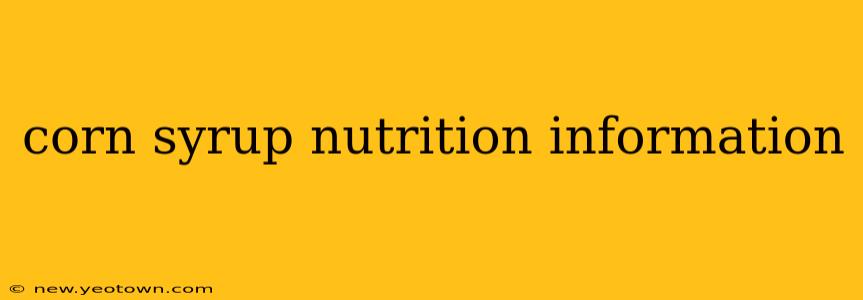Corn syrup, that ubiquitous sweetener found in countless processed foods, often sparks curiosity (and sometimes concern) among consumers. Its seemingly simple name belies a surprisingly complex nutritional profile and a history interwoven with the evolution of the food industry. Let's unravel the mysteries surrounding this common ingredient, exploring its nutritional facts, potential health implications, and common misconceptions.
What is Corn Syrup, Exactly?
Before diving into the nutritional specifics, let's establish a clear understanding of what corn syrup actually is. It's a sweetener produced from the starch of corn kernels. Through a process of enzymatic hydrolysis, the complex carbohydrates in corn starch are broken down into simpler sugars, primarily glucose and maltose. This process transforms the starch into a liquid, syrupy form, ideal for various culinary and industrial applications. There are different types of corn syrup, each with its own unique properties. High-fructose corn syrup (HFCS), for instance, undergoes further processing to increase its fructose content, giving it a sweeter taste than regular corn syrup.
Corn Syrup Nutrition Facts: A Closer Look
A typical serving size (roughly one tablespoon, or about 15 grams) of corn syrup contains approximately 45 calories, all derived from carbohydrates. It's essentially pure sugar, with negligible amounts of vitamins, minerals, or fiber. This lack of micronutrients is a key element to consider when evaluating its place in a balanced diet. While it provides quick energy, its rapid absorption into the bloodstream can lead to a sudden spike in blood sugar levels. This is particularly relevant for individuals managing conditions like diabetes.
What are the Different Types of Corn Syrup?
Several varieties of corn syrup exist, each differentiated by its processing and resulting composition. Let's briefly explore some common types:
-
Regular Corn Syrup: This type primarily consists of glucose and maltose. It's often used in candies, baked goods, and other applications where a less intensely sweet flavor profile is preferred.
-
High-Fructose Corn Syrup (HFCS): This widely used sweetener has a higher fructose content, making it sweeter than regular corn syrup. Its widespread use in processed foods has been a subject of much debate regarding potential health implications.
-
Dried Corn Syrup: This form is obtained by removing the water from corn syrup, resulting in a powdered form frequently used as a food ingredient.
Is Corn Syrup Bad for You? Understanding the Health Implications
The question of whether corn syrup is "bad" is complex and nuanced. It boils down to moderation and context. Consuming excessive amounts of any added sugar, including corn syrup, is associated with a range of health problems, such as weight gain, type 2 diabetes, heart disease, and non-alcoholic fatty liver disease. The high fructose content in HFCS is a particular concern as fructose metabolism differs from glucose, potentially contributing to these negative health outcomes. However, corn syrup in moderation, as part of a balanced diet, is unlikely to pose significant health risks for most individuals. Focusing on a whole-foods diet and limiting added sugar intake remains crucial for maintaining optimal health.
What are the Alternatives to Corn Syrup?
Fortunately, there are many healthier alternatives to corn syrup and HFCS available. These include:
-
Honey: A natural sweetener with trace minerals and antioxidants.
-
Maple Syrup: Another natural option with unique flavor and some nutrients.
-
Agave Nectar: A sweeter option but with a higher fructose content than corn syrup. Moderation is key.
-
Stevia: A natural, low-calorie sweetener that is much sweeter than sugar.
How Much Corn Syrup is Too Much?
The American Heart Association recommends limiting added sugar intake to no more than 25 grams per day for women and 36 grams per day for men. This recommendation encompasses all added sugars, including corn syrup. Checking food labels and being mindful of hidden sugars is essential for staying within these limits. By reducing overall added sugar intake, including corn syrup, you make positive strides towards improving your health and wellbeing.
This exploration of corn syrup nutrition information provides a comprehensive overview, addressing concerns and offering balanced insights. Remember that a healthy diet is about overall balance and moderation, and understanding the nutritional composition of common ingredients allows for informed food choices.

